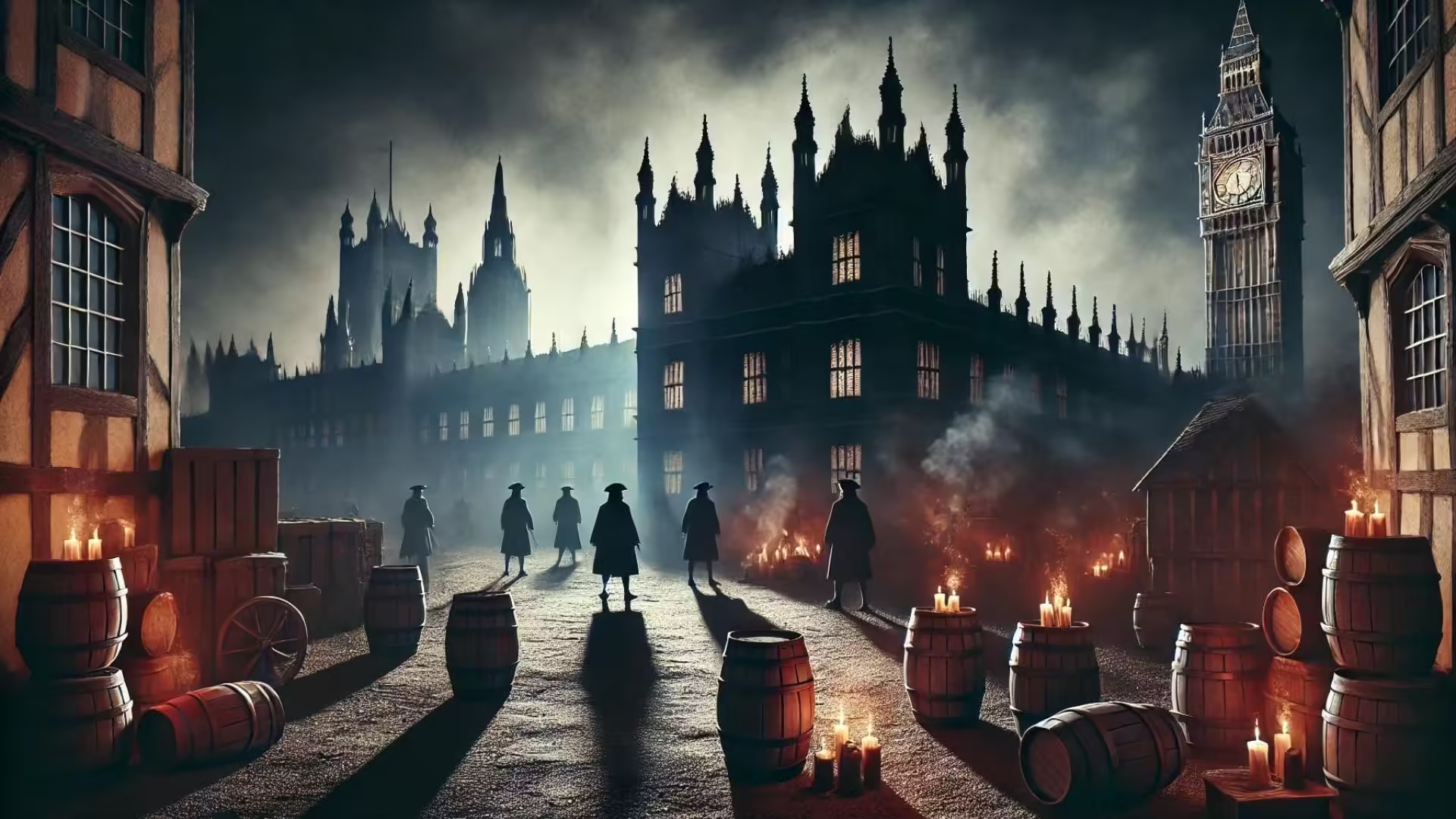The Gist
In the early 17th century, England was a nation simmering with religious and political tension. King James I had taken the throne, and despite initial hopes from Catholic subjects for religious tolerance, persecution against them continued. This led to one of the most dramatic and infamous conspiracies in British history—The Gunpowder Plot of 1605, a failed attempt to blow up the House of Lords and assassinate the King.
The plan, led by a group of disillusioned Catholics, was thwarted before it could be executed, but its legacy continues to be felt centuries later. Let’s dive into the gripping tale of the Gunpowder Plot and explore why its impact still resonates today.
The Story of the Gunpowder Plot
It all began with a group of Catholic conspirators who were growing increasingly frustrated by King James I’s refusal to grant religious freedom to Catholics. Among these conspirators was Robert Catesby, a charismatic and determined leader who convinced others to join him in a radical plot to overthrow the Protestant government and restore Catholicism in England. The plan? To blow up the House of Lords during the State Opening of Parliament on November 5, 1605, and kill the King, his government, and much of the Protestant aristocracy in one massive explosion.
Catesby and his fellow conspirators, including the infamous Guy Fawkes, rented a cellar beneath the House of Lords and stockpiled 36 barrels of gunpowder. Fawkes, a soldier experienced with explosives, was tasked with lighting the fuse. However, their plan was destined to fail.
A key moment in the story came when one of the conspirators, concerned that innocent Catholics might be caught in the blast, sent an anonymous letter to Lord Monteagle, warning him to avoid the State Opening. Suspicious, Monteagle took the letter to the authorities, and on the night of November 4, 1605, the plot was uncovered. Guy Fawkes was discovered in the cellar with the explosives and was promptly arrested. Under torture, Fawkes revealed the names of his fellow conspirators, who were soon captured or killed while trying to escape.
The Aftermath and Significance
The failed Gunpowder Plot sent shockwaves through England. The conspirators were executed, and anti-Catholic sentiment surged as a result. Catholics were further marginalized, and stricter laws were enacted to prevent any future attempts to challenge the Protestant rule.
The event’s significance, however, extends beyond the immediate crackdown. The discovery of the Gunpowder Plot became a turning point for how England viewed treason, religious dissent, and government security. To this day, the tradition of the State Opening of Parliament includes a ceremonial search of the cellars beneath the Houses of Parliament to ensure no repeat of such an event occurs.
The Gunpowder Plot’s failure has also become deeply embedded in British culture. Every year on November 5th, Bonfire Night (also known as Guy Fawkes Night) is celebrated with fireworks, bonfires, and the burning of effigies of Guy Fawkes. What began as a celebration of the plot’s failure has evolved into a broader cultural event, but its roots remain in this dramatic episode of history.
Why the Gunpowder Plot Still Matters
The Gunpowder Plot remains relevant today for several reasons. Politically, it reinforced the power of the monarchy and the importance of loyalty to the crown, shaping the political landscape of England for generations. Religiously, it marked a significant moment in the history of religious tension between Catholics and Protestants in England, contributing to the long-lasting division between the two faiths.
Culturally, the plot has left a lasting legacy. The image of Guy Fawkes, once seen as a villainous figure, has taken on new meaning in modern times. His face, immortalized in masks worn by activists, symbolizes rebellion against oppressive governments, most famously in the graphic novel and film V for Vendetta. The cultural transformation of Fawkes from a traitor to a symbol of resistance speaks to the enduring fascination with the Gunpowder Plot.
The Gunpowder Plot is more than just a failed attempt at revolution—it’s a story of political intrigue, religious conflict, and the lengths people will go to for their beliefs. Its impact on British history is undeniable, from the continued persecution of Catholics in the aftermath to its cultural significance in modern times.
As we reflect on this event, we’re reminded of the power of history to shape national identity and cultural memory. Even now, centuries later, the echoes of the Gunpowder Plot can still be felt in the political and cultural landscape of the UK. So, the next time you see fireworks lighting up the night sky on Bonfire Night, remember that the sparks fly in memory of a plot that almost changed the course of England’s history forever.
Expand Your Vocabulary
- Conspirator
Definition: A person who takes part in a secret plan to commit an illegal or harmful act.
Contextual Use: Robert Catesby and Guy Fawkes were conspirators in the Gunpowder Plot, aiming to overthrow the government.
Everyday Use: “The hackers acted as conspirators, working together to breach the company’s security system.” - Assassinate
Definition: To murder an important person, usually for political reasons.
Contextual Use: The plotters planned to assassinate King James I by blowing up Parliament.
Everyday Use: “In many films, characters try to assassinate leaders to disrupt governments or gain power.” - Stockpiled
Definition: To accumulate a large supply of something for future use.
Contextual Use: The conspirators stockpiled barrels of gunpowder under the House of Lords.
Everyday Use: “People stockpiled food and supplies before the storm hit.” - Treason
Definition: The crime of betraying one’s country, especially by attempting to kill or overthrow the government.
Contextual Use: The Gunpowder Plot is one of the most famous acts of treason in English history.
Everyday Use: “In medieval times, treason was often punishable by death.” - Effigy
Definition: A sculpture or model of a person, often made to be destroyed as a symbol of protest or anger.
Contextual Use: On Bonfire Night, effigies of Guy Fawkes are burned to commemorate the failed plot.
Everyday Use: “During the protest, an effigy of the corrupt leader was set on fire as a sign of defiance.” - Persecution
Definition: Hostility and ill-treatment, especially because of race, political or religious beliefs.
Contextual Use: Catholics faced persecution in England, which fueled the motivation behind the Gunpowder Plot.
Everyday Use: “Throughout history, many groups have faced persecution because of their beliefs.” - Marginalized
Definition: Treated as insignificant or pushed to the edges of society.
Contextual Use: After the plot’s failure, Catholics were further marginalized in English society.
Everyday Use: “Many minority communities feel marginalized and excluded from equal opportunities.” - Ceremonial
Definition: Related to or used in formal events or rituals.
Contextual Use: Today, a ceremonial search of the Houses of Parliament is conducted as a reminder of the plot.
Everyday Use: “The queen’s arrival at the event was marked by a ceremonial guard of honor.” - Rebellion
Definition: The act of resisting authority, control, or tradition.
Contextual Use: The Gunpowder Plot was seen as a Catholic rebellion against the Protestant rule of England.
Everyday Use: “The teenagers’ rebellion against the school’s strict dress code sparked heated debates.” - Legacy
Definition: Something handed down by a predecessor, especially traditions, achievements, or consequences.
Contextual Use: The legacy of the Gunpowder Plot is still seen in the annual Bonfire Night celebrations.
Everyday Use: “Her legacy as an advocate for education reform continues to inspire new generations.”
Let’s Talk
- Do you think the actions of the Gunpowder Plot conspirators were justified based on their desire for religious freedom?
Consider the balance between seeking freedom and committing acts of violence. Can extreme measures like this ever be justified? - Why do you think Guy Fawkes has become the central figure associated with the Gunpowder Plot, even though he was not the leader?
What makes certain historical figures stand out more than others, even when their role wasn’t the most prominent? - How has the legacy of the Gunpowder Plot influenced modern celebrations like Bonfire Night?
Think about how this event, which began as a failure of rebellion, has turned into a cultural event with fireworks and festivities. How has its meaning evolved over time? - What parallels can you draw between the religious conflicts of 17th-century England and modern-day struggles for religious freedom around the world?
Do you see any similarities between the persecution of Catholics in England and the treatment of certain religious groups today? - How does the Gunpowder Plot illustrate the consequences of political and religious intolerance?
Reflect on how the suppression of religious beliefs led to such extreme actions and what lessons can be learned about tolerance in society. - Why do you think traditions like the ceremonial search of the Houses of Parliament continue today, even though the Gunpowder Plot occurred over 400 years ago?
What value do these traditions hold in keeping history alive, and do they still serve a meaningful purpose? - What role do symbolic acts, like burning an effigy, play in public protests or celebrations?
How do you think people use symbolism in events like Bonfire Night or modern protests to express political or social views? - Do you think modern resistance movements can draw inspiration from historical events like the Gunpowder Plot?
In what ways do you see modern-day movements using history as a tool for rebellion or change? - How might history have been different if the Gunpowder Plot had succeeded?
Imagine what the political and religious landscape of England might have looked like had the plot been successful. How would it have changed history? - Why do you think certain historical events, like the Gunpowder Plot, remain relevant in today’s society?
What can we learn from these events, and how do they continue to shape the world we live in?










0 Comments